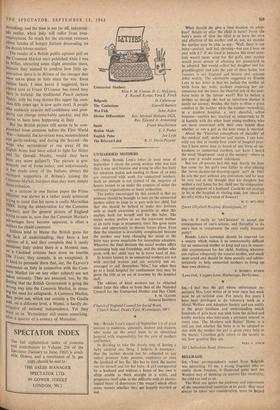Unmarried Mothers Miss P. M. Chasse, H. C. McLaren, F.
Russell Rymer, Vera E. Finch Belgrade D. Cekerevac The Centurions Correlli Barnett Wet Fish John Arden Divine Differentials Rev. Michael Malsom, OGS, Rev. Edward A. Armstrong Spain Frank MacDertnot British Made E. J. Pories English Pubs Joe Lycie The Beloved Land R. G. Davis-Poynter UNMARRIED MOTHERS
Sin,--Miss Brenda Leys's letter in your issue of September 1 about the young woman who was told that it was un-Christian and wrong to offer her baby for adoption makes sad reading to those of us who are concerned with work for unmarried mothers. Such an attitude is not typical Of the majority of homes known to us under the auspices of either the voluntary organisations or local authorities.
The policy encouraged by this council is that no pressure should be brought to bear on the unmarried mother either to keep or to part with her child, but that she should be helped to make her decision with as much awareness as possible ot what this implies, both for herself and for the baby. The social worker prefers to see the expectant mother at an early stage in pregnancy, since this gives more time and opportunity to discuss future plans. Even then the situation is invariably complicated because the mother may keep changing her mind or the baby may prove unsuitable for immediate adoption. Whatever the final decision the social worker offers continuing help and friendship, and the mother who parts with her child may be in more need of this.
In homes known to us unmarried mothers are not with married women and are certainly not en- couraged to call themselves 'Mrs.,' but when they go to a local hospital for confinement they may be given the title as an act of courtesy by the hospital staff.
The address of local workers can be obtained either from this office or from that of the National Council for the Unmarried Mother and Her Child. P. M. CLAISSE
General Secretary
Church of England Council for Social Work, Church House, Dean's Yard, Westminster, SW!


































 Previous page
Previous page